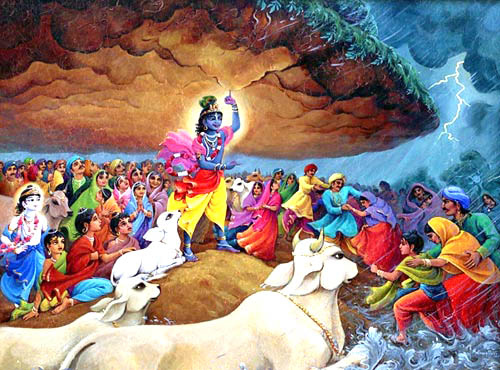Question: What is the secret of advancing in Krishna Bhakti from the Sadhana Bhakti (regulated devotional service) to the next stages?
Answer by Romapada Swami:
Bhakti is independent. In Digest 00042B, Q-2 we discussed how the appearance of bhakti in one’s heart is independent of any material activity, and that bhakti is the cause of bhakti. One gets bhakti through the medium of a devotee, a carrier of bhakti. This holds true not only in the beginning but in the later stages of bhakti also.
In other words bhakti grows in our heart by her own sweet will. Caitanya Mahaprabhu compares bhakti to a creeper. The devotee sows the seed in our hearts, and the activities of sadhana, such as hearing and chanting are like watering the bhakti creeper. When we carefully nourish the creeper and protect it from the weeds of our bad habits and offenses, then by the sunshine of Krishna’s mercy, she grows. The flowering and fruition of this creeper are compared to the later stages of spontaneous love of God, which is beyond the regulated devotional stage.
Our sadhana of watering the creeper is indispensable but nor sufficient. We cannot force bhakti to grow or purchase Krishna through any amount of perfectly executed sadhana. The real secret is the mercy of Krishna, which flows very wonderfully and freely through the medium of His wonderful devotees. Our sadhana is our way of showing Krishna our sincere and intense desire to attain His lotus feet. Upon seeing our devotional efforts in a mood of humility, Krishna, His devotees and Bhakti devi, who are naturally merciful, may shower Their mercy. Krishna then helps the devotee to eradicate from his/her heart all anarthas (unwanted desires and tendencies unfavorable to Krishna bhakti). This stage is called anartha-nivrtti. When this is successfully accomplished, then the creeper of bhakti grows into the stages of steadiness, taste, attachment, and spontaneous attraction respectively and finally produces the wonderful fruits of Krishna prema. (For a detailed explanation please refer to Madhurya Kadambini by Visvanatha Cakravarthi Thakur; and Srimad Bhagavatam. 1.2.17-21)







